Author:Kuleen ◎
Compiled by: TechFlow

It seems we are entering a phase of "Cambrian-style explosion" at the intersection of AI and crypto, with a proliferation of experiments across various use cases. This fills me with excitement about the potential for future innovations. I would like to share our @SolanaFndn's perspective on some exciting new opportunities in the ecosystem.
Summary
Building the most vibrant AI-driven economy on Solana
Truth Terminal has demonstrated a preliminary possibility of what AI agents can achieve when they are able to interact on-chain. We are very excited to see some experiments that can push the boundaries of agent capabilities on-chain in a secure manner. The potential in this area is immense, and we are just beginning to explore the design space. In fact, this has become one of the most surprising and explosive directions in the crypto and AI space, and this is just the beginning.
Enhancing LLM capabilities in Solana code development to empower Solana developers
Large language models (LLMs) have already demonstrated powerful code generation capabilities, and this is only going to get stronger in the future. We hope to leverage these capabilities to increase the efficiency of Solana developers by 2 to 10 times.
In the short term, by establishing high-quality benchmarks to assess LLM's understanding of the Solana ecosystem and its ability to write Solana code (more details below), we will better understand the potential impact of LLMs on the Solana ecosystem. We look forward to supporting teams in building high-quality model fine-tuning, and validating their effectiveness through their performance on these benchmarks!
Supporting an open and decentralized AI technology stack
The "open and decentralized AI technology stack" refers to a set of open and decentralized protocols that can provide the following resources: data for training, the computational resources for training and inference, the generated model weights, and the ability to verify model outputs (i.e., "verifiable computation").
The importance of this open AI stack lies in:
Accelerating experimentation and innovation in model development
Providing an alternative for those who do not trust existing AI (such as AI approved by certain countries)
Details
Here are more details on why we are excited about these three pillars and the directions we hope to see in their development.
1. Building the most vibrant AI-driven economy on Solana
Why are we focused on this area?
There has been a lot of discussion about Truth Terminal and $GOAT, so I won't go into that again. But it's fair to say that the potential of AI agents interacting on-chain has already been unleashed (and these agents haven't even taken direct action on-chain yet).
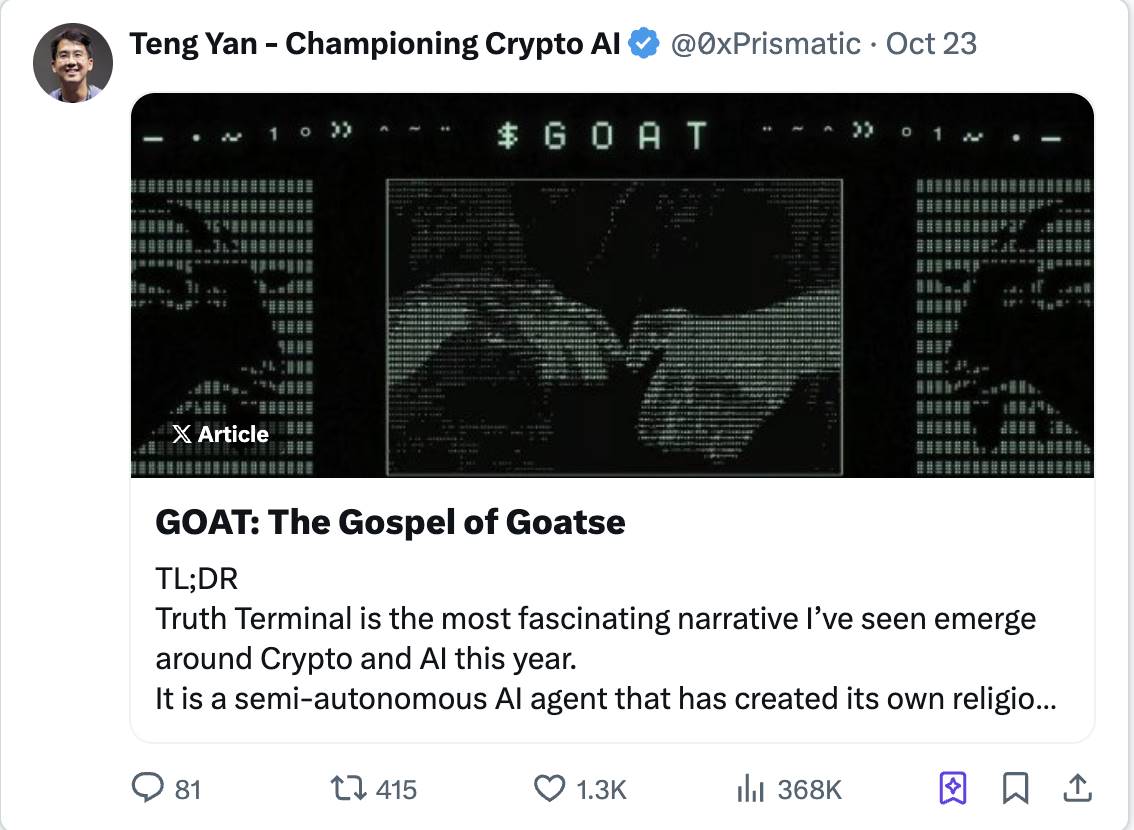
We can candidly say that we don't yet have a clear answer about how the future development of on-chain agent behavior will unfold. But to give you a sense of the breadth of the design space, here are some cases that have already occurred on Solana:
AI "leaders" like Truth Terminal are experimenting with building communities akin to emerging religions through memecoins like $GOAT.
Some applications, such as @HoloworldAI, @vvaifudotfun, @TopHat_One, and @real_alethea, allow users to easily create and deploy agents and their associated tokens.

AI fund managers make investment decisions by mimicking the personalities of famous crypto investors through their agents, and "cheer on" their investment portfolios. For example, @ai16zdao's rapid rise on @daosdotfun has created a new trend of AI funds combined with agent cheerleading.
Agent-based games, such as @ParallelColony, where players "play" the game by prompting agents to take actions, often resulting in unexpected innovations.
Possible future developments
Agents could manage complex projects that require multi-party economic coordination. These projects could be complex scientific research tasks, such as "finding a compound that can treat [X] disease". Agents might execute the following steps:
Raise funds by issuing tokens on @pumpdotscience.
Use the raised funds to pay for access to relevant paid research content and to cover the costs of running simulations on decentralized computing networks (such as @kuzco_xyz, @rendernetwork, @ionet, etc.).
Leverage bounty platforms like @gib_work to recruit humans to complete necessary real-world tasks (e.g., running experiments to validate or extend simulation results).
Or they could execute simple tasks like creating a website for you; or AI-generated art (like @0xzerebro). The possibilities are nearly limitless.
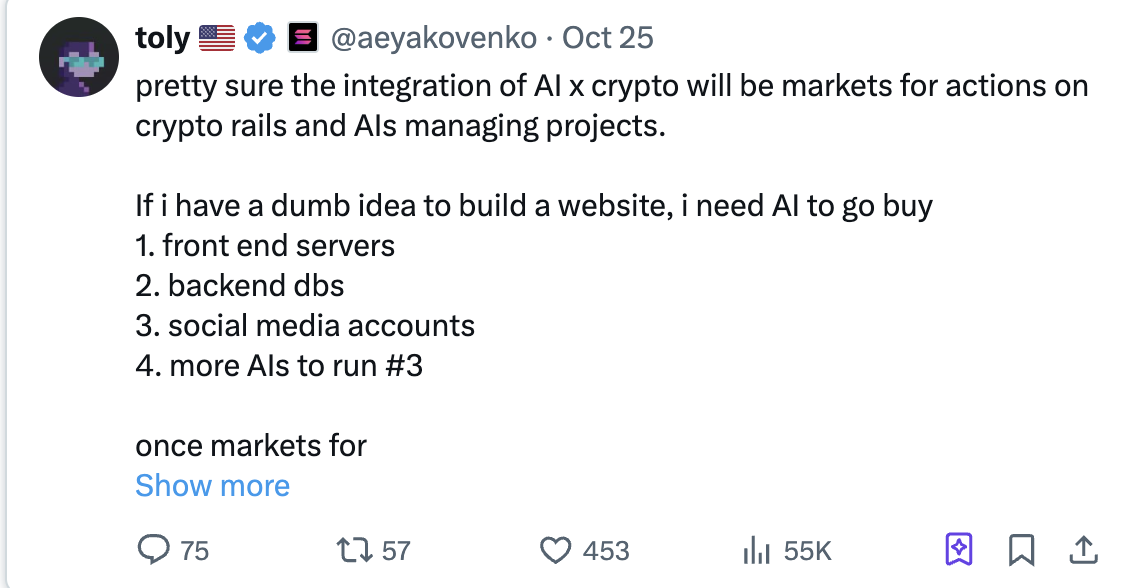
Why does it make more sense for agents to execute financial activities on-chain?
While agents can leverage both traditional finance and crypto, crypto has unique advantages in the following areas:
Micropayment scenarios: Solana has excelled in this area, with applications like Drip demonstrating its potential.
Speed advantage: Instant settlement is crucial for agents seeking to maximize capital efficiency.
Access to capital markets through DeFi: Once an agent's financial activities go beyond simple payments, the advantages of crypto become more apparent. This may be the most important reason for agents to participate in the crypto economy. Agents can seamlessly engage in asset minting, trading, investing, borrowing, and leveraging. Solana's ecosystem is particularly well-suited to support these capital market activities, as its mainnet already has a wide range of top-tier DeFi infrastructure.
Finally, technological development often has a certain inertia. This is not just about the merits of the product itself, but is closely related to who can reach critical mass first and become the default choice. If more agents create significant wealth through crypto in the future, this could solidify crypto's position as a key capability for agents.
The direction we hope to see
We encourage bold experiments to endow intelligent agents with wallet capabilities and on-chain execution capabilities. Given the extremely wide range of possibilities, we do not impose too many restrictions on specific directions. In fact, we believe that the most interesting and valuable applications of intelligent agents are often those that we cannot foresee. Nevertheless, we are particularly interested in exploring the following directions and infrastructures:
Limiting the negative impact of delusions: While the current models perform well, they are still not perfect. The actions of intelligent agents must be subject to certain restrictions and not be completely unrestrained.
Promoting non-speculative use cases: For example, purchasing tickets through @xpticket, optimizing the returns of a stablecoin investment portfolio, or purchasing food on DoorDash, which are actual application scenarios.
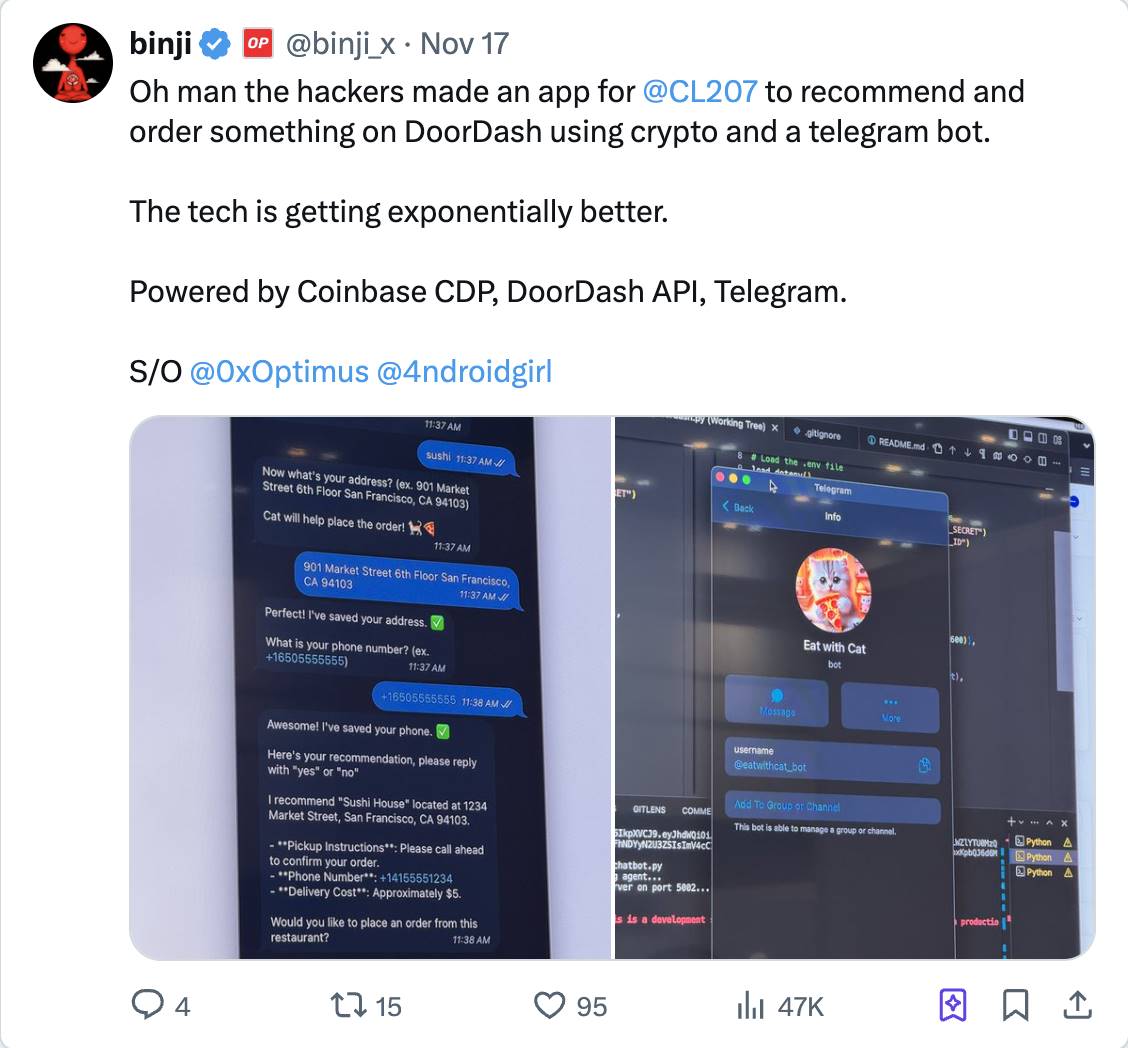
At least reach the testnet prototype stage (preferably already launched on the mainnet)
2. Enhance the ability of LLMs to write Solana code and empower Solana developers
Why do we value this?
Large language models (LLMs) have already demonstrated impressive capabilities and are progressing rapidly. Particularly in the field of code writing, the improvement speed of LLMs may be very fast, as this is a task that can be evaluated based on objective standards. As mentioned below, "Programming has a unique advantage: it allows for massive data scaling through 'self-play'. Models can write code and run it, or write code, write tests, and check the consistency of the results."

Although LLMs are not yet perfect in writing code, especially in terms of finding vulnerabilities, AI-native code editors like Github Copilot and Cursor have fundamentally changed the way software development is done (and even the way companies recruit talent). With the rapid progress of these models, software development may be completely revolutionized. We hope to leverage this trend to increase the productivity of Solana developers by 10 times.
However, LLMs currently face some challenges in understanding Solana:
Lack of sufficient high-quality raw data for LLM training.
Insufficient verified builds to provide reliable reference data for LLMs.
Lack of high-quality Q&A interactions on platforms like Stack Overflow.
The rapid updates of Solana's infrastructure lead to some old code being incompatible with the current version.
Developers lack effective tools to evaluate the LLM's understanding of Solana.
The progress we hope to see:
Help us publish more high-quality Solana data on the internet!
Encourage more teams to release verified code builds.
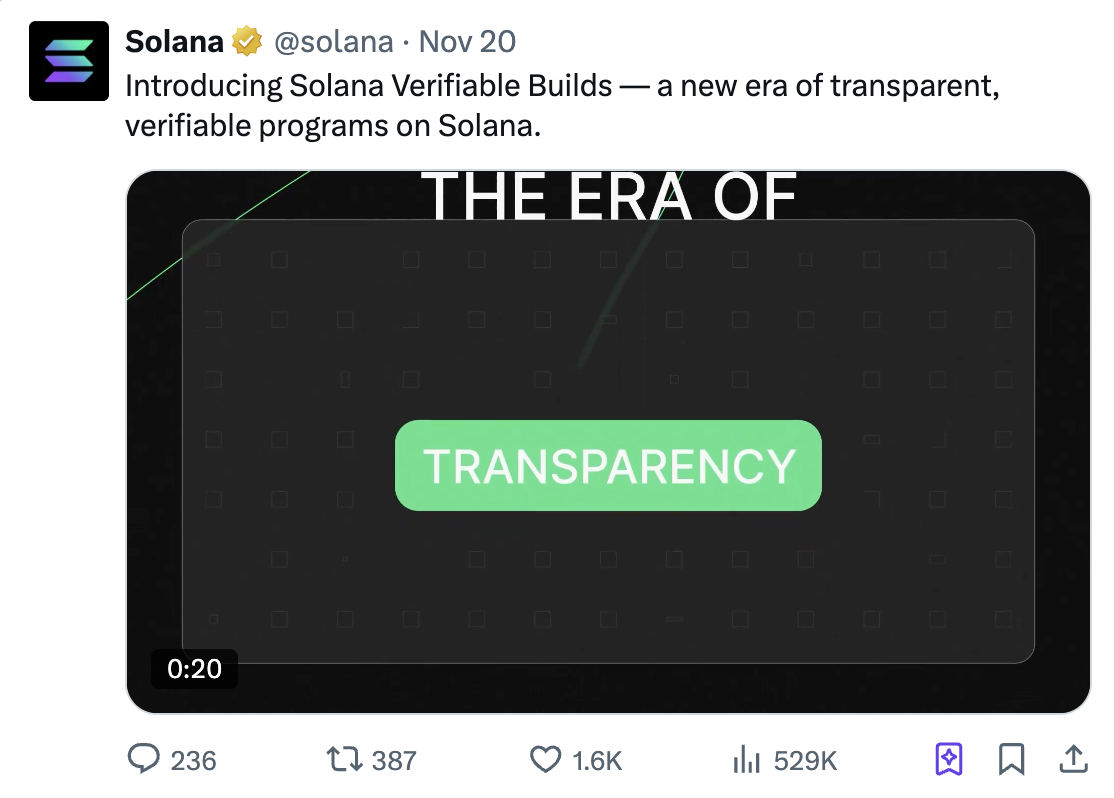
Promote community members to actively ask and answer questions on Stack Exchange, forming high-quality technical discussions.
Develop high-quality benchmark tests to evaluate the LLM's understanding of Solana (RFP to be released soon).
Develop LLM fine-tuned models that can perform well on the benchmark tests and truly improve the efficiency of Solana developers. We plan to provide rewards for the first model to reach the benchmark score, so stay tuned.
A landmark achievement would be an AI-generated high-quality Solana validator client.
3. Support an open and decentralized AI technology stack
Why do we value this?
It is currently unclear how the development of AI will balance between open source and closed source in the future. Closed-source AI may continue to occupy the forefront and capture most of the value from the underlying models. At the same time, open-source models may also exhibit unique advantages through rapid iteration and fine-tuning for specific use cases.
We hope that Solana can be closely integrated with the open-source AI ecosystem. Specifically, this means supporting access to the following: data for training, computational resources for training and inference, the generated model weights, and the ability to validate the model outputs. This is crucial for the following reasons:
1/ Open-source models accelerate innovation and experimentation
The rapid optimization and fine-tuning of open-source models like Llama by the community shows that the community can significantly complement the efforts of large AI companies and drive the frontiers of AI capabilities. As a Google researcher once pointed out, "In open source, we and OpenAI both have no moats." A thriving open-source AI stack is crucial for accelerating industry progress.
2/ Provide trustworthy AI alternatives for users
AI has become one of the most powerful control tools in the hands of authoritarian regimes. State-sanctioned AI models may provide an "official version of the truth" and become a powerful means of controlling public opinion. Supporting an open AI stack can provide trustworthy alternatives for users who do not trust official AI.
Solana has become the home for several projects supporting an open AI stack
Grass and Synesis One are driving data collection efforts.
@kuzco_xyz, @rendernetwork, @ionet, @theblessnetwork, and @nosana_ai are providing decentralized computing resources to support AI training and inference.
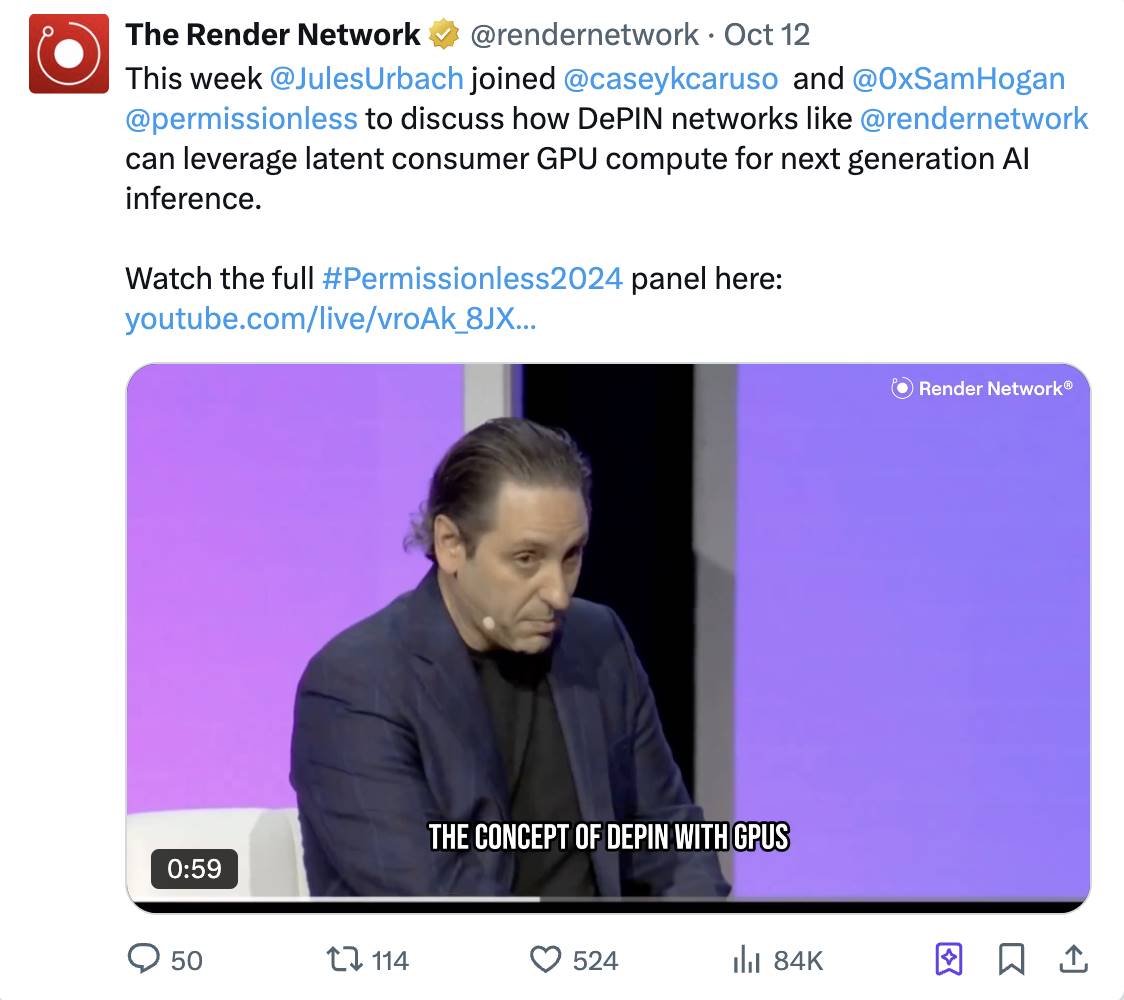
Teams like @NousResearch and @PrimeIntellect are developing frameworks to enable decentralized AI training (see the image below)
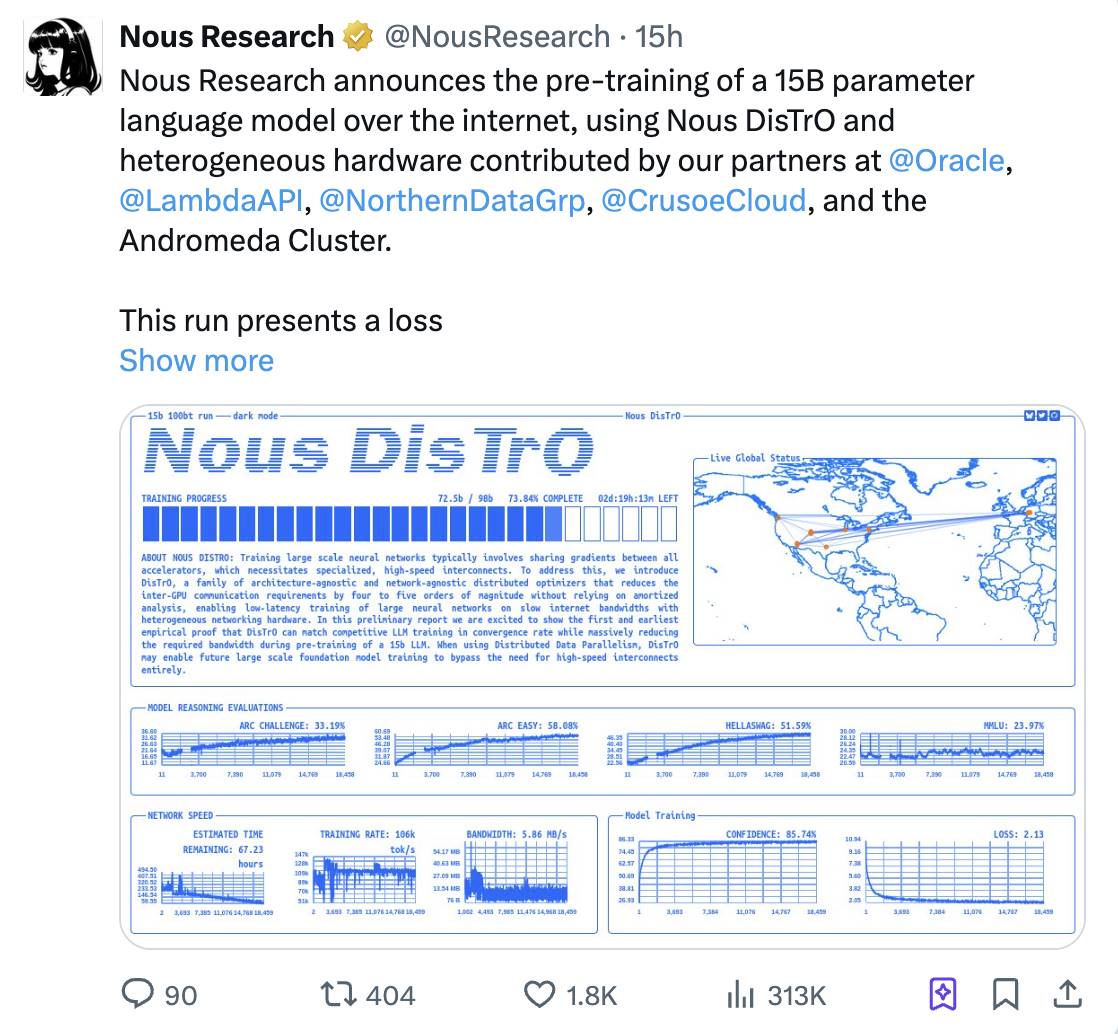
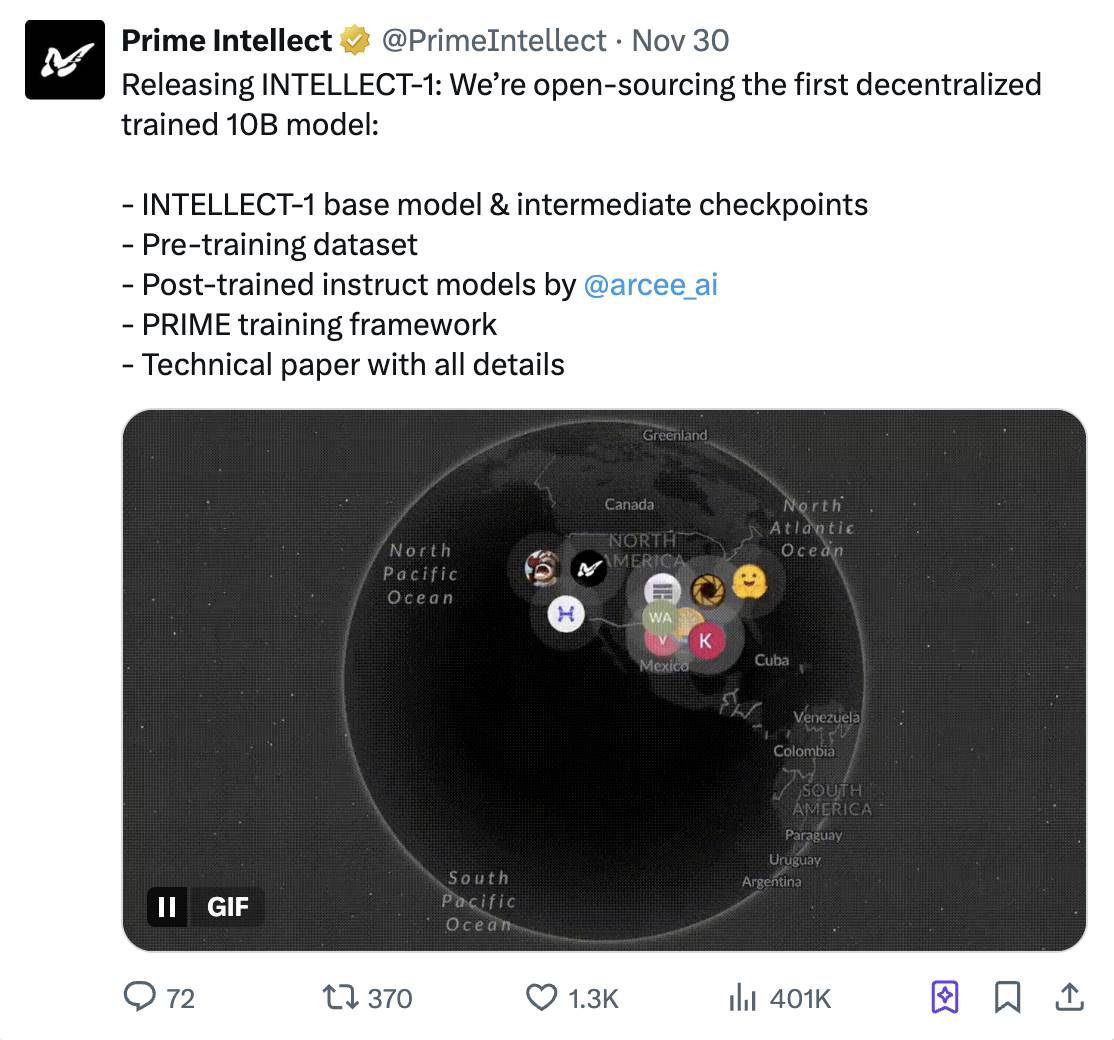
The progress we hope to see
Build more innovative products at every layer of the open-source AI stack
Decentralized data collection: For example, @getgrass_io, @usedatahive, and @synesis_one, these projects collect data through distributed networks to support the training of AI models.
On-chain identity: Develop protocols that allow wallets to prove their holders are human identities, or to verify the content of AI API responses. This way, users can confirm they are interacting with a large language model (LLM) and ensure the transparency and credibility of the interaction.
Decentralized training: For example, @exolabs, @NousResearch, and @PrimeIntellect, these teams are exploring how to leverage distributed computing resources to train AI models, thereby reducing costs and improving efficiency.
Intellectual property (IP) infrastructure: Develop tools that allow AI to automatically complete the authorization and payment process when using content. This not only protects the rights of content creators, but also paves the way for the legitimate use of AI models.








